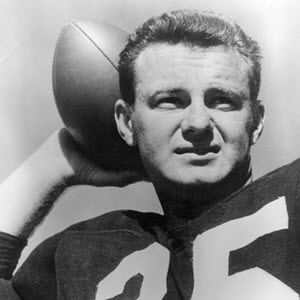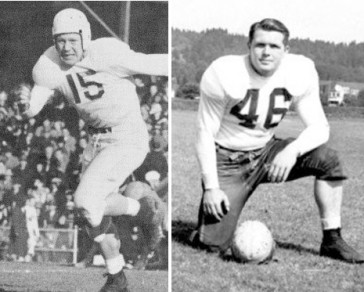Coming off its decisive victory over Washington State, Oregon was ranked 14th in the country with five wins and one loss.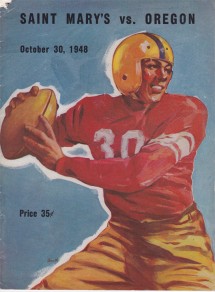
The remainder of the regular season schedule included a final home game against the St. Mary’s Gaels, and three consecutive road games against the Washington Huskies, UCLA Bruins, and Oregon State Beavers.
Oregon had played an annual Thanksgiving Day game with St. Mary’s in the 1930’s, the last time the two teams had played each other. The Ducks had not fared well in those previous meetings, having lost six of the seven previous contests. However, Oregon would be favored in the 1948 game by three touchdowns, the first time Oregon had been favored over the Gaels. St. Mary’s team was smaller than Oregon and consisted primarily of sophomores.
In the week leading up to the game, rumors continued to swirl regarding who the Conference’s Rose Bowl representative would be if Oregon and California remained tied for the Conference championship at the end of the regular season. The late Royal Brougham of the Seattle Post-Intelligencer reported that Washington would vote to send California to the Rose Bowl because of the poor relationship between the two schools. Washington officials quickly denied the report.
The October 30th game against St. Mary’s would again demonstrate Oregon’s tendency to play down to the level of the competition. With only a little more than three minutes left in the game, the Gaels held a 13-7 lead. Oregon managed to mount a scoring drive capped by a Van Brocklin to Wilkins pass in the end zone. The Ducks took the lead at 14-13, but St. Mary’s still had two minutes to score. However, Benny Holcomb intercepted a Gael pass to secure Oregon’s victory. Oregon was extremely lucky to have won this game, and the lackluster performance caused Oregon to drop to 16th in the rankings.
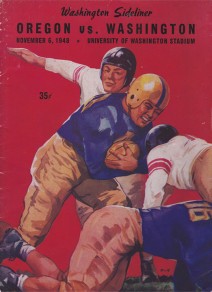 Next up would be the Huskies in Seattle. Neither team would score in the first half. In the third quarter, a Van Brocklin to Wilkins pass got Oregon on the scoreboard. The Ducks would get their second touchdown in the fourth quarter on a Van Brocklin to Garza pass. Oregon 13 Washington 0. Washington would not score until the last five minutes of the game, but it would be too little too late. The final score was Oregon 13 Washington 7. The victory would see the Ducks rise to 15th in the rankings. California continued to be ranked 4th.
Next up would be the Huskies in Seattle. Neither team would score in the first half. In the third quarter, a Van Brocklin to Wilkins pass got Oregon on the scoreboard. The Ducks would get their second touchdown in the fourth quarter on a Van Brocklin to Garza pass. Oregon 13 Washington 0. Washington would not score until the last five minutes of the game, but it would be too little too late. The final score was Oregon 13 Washington 7. The victory would see the Ducks rise to 15th in the rankings. California continued to be ranked 4th.
In the week following the game, questions began to arise whether Van Brocklin would turn professional after the 1948 season. Professional rules at the time provided that a college player was not eligible until his original class had graduated, and in Van Brocklin’s case that would have been 1950. Van Brocklin himself told the Register-Guard that he was interested in playing pro football, but only after he completed his final season of eligibility in 1949. History reveals that somewhere along the line Van Brocklin changed his mind.
Of equal importance to Oregon and its fans, was the demand made by Oregon for a playoff game against California if they both remained tied at the end of the regular season. However, California, anticipating a favorable vote for the Rose Bowl, rejected Oregon’s offer and sent its scouts to watch Northwestern, the presumptive Big 9 representative in the Rose Bowl. Rumors at the time suggested that if the vote did not go California’s way, the Bears would refuse to schedule games against teams in the Northwest, other than Washington, to retaliate. Such an action would hurt the Northwest teams financially. Interestingly, Oregon had attempted to schedule a regular season game with California before the 1948 season began, but California rejected that proposal. Obviously, California wanted no part of this Oregon team.
Oregon’s next game against UCLA would be a Friday night game in Los Angeles, where they would dismantle the Bruins 26 to 7. 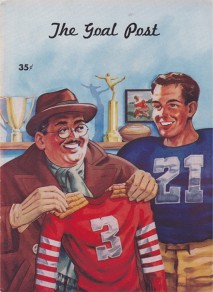 What is significant about this game was not the amount of points scored by the Ducks, but how dominant Oregon’s defense was becoming. The defense had shut out the Huskies until the final five minutes, and against UCLA the first team defense did not allow the Bruins to cross the 50-yard line in the first half. With Duck reserves in the game in the second half, UCLA could penetrate no closer to the Oregon goal line than the 22-yard line in the third quarter. It was not until the fourth quarter that UCLA managed to get the ball into Oregon’s end zone. The victory over UCLA would see Oregon ranked 13th.
What is significant about this game was not the amount of points scored by the Ducks, but how dominant Oregon’s defense was becoming. The defense had shut out the Huskies until the final five minutes, and against UCLA the first team defense did not allow the Bruins to cross the 50-yard line in the first half. With Duck reserves in the game in the second half, UCLA could penetrate no closer to the Oregon goal line than the 22-yard line in the third quarter. It was not until the fourth quarter that UCLA managed to get the ball into Oregon’s end zone. The victory over UCLA would see Oregon ranked 13th.
The Civil War would be the final regular season game. Oregon, while favored, knew that it would be a struggle to defeat the Beavers in Corvallis, particularly on a wet, muddy field. Indeed, the game did prove to be a struggle for both teams. While the Duck’s running game performed well, gaining over 250 yards rushing, that effort was offset by five fumbles. A 15-yard run by Johnny McKay in the second quarter got Oregon its first score. Oregon 7 Oregon State 0. In the fourth quarter, Chet Daniels would kick a 27-yard field goal. That was the first field goal Oregon had made in 10 years. Oregon 10 Oregon State 0. George Bell was Oregon’s offensive star of the game rushing for 115 yards, and Dick Wilkins set a new Pacific Coast Conference (PCC) receiving record with his two receptions, but it was Oregon’s defense again rising to the occasion by allowing the Beavers to get no closer to Oregon’s goal line in the first half than the 23-yard line and the 40-yard line in the second half.
Now all that remained was for the PCC faculty representatives to vote for the Conference’s Rose Bowl representative. That vote was scheduled to start following the conclusion of the day’s games. More rumors swirled that if California did not get the Rose Bowl bid the four California schools and Washington would leave the Conference and form their own Big 5 Conference, which is exactly what would happen a decade later.
Next up, the vote and how Oregon got to the Cotton Bowl in Part 4.
Related Articles:
Jim currently resides in Ellensburg, Washington where he has had the opportunity to watch former Ducks such as NaDerris Ward and Scott Grady play for Central Washington University, Jim’s alma mater. However, Jim was born in Eugene and attended Howard Elementary School, and what then called Colin Kelly Junior High School before moving to Washington. Jim began following the Ducks during the 1957 season and had the opportunity to watch a number of games at Hayward Field. Over the years, Jim has developed a wealth of knowledge about Oregon sports history. When not editing on Fanbase.com or working in his garden, Jim manages to find time to practice law.

